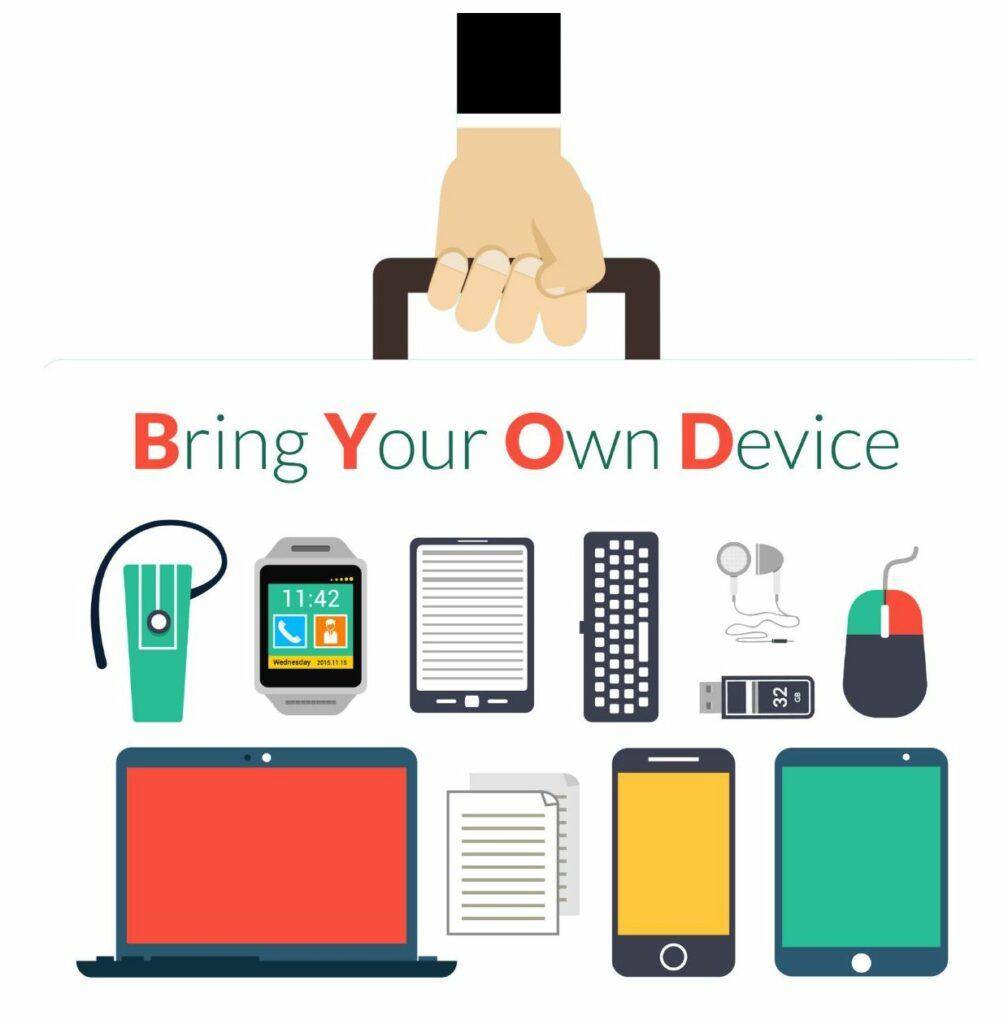BYOD (Bring Your Own Device): Benefits, Risks, and Cyber Security Considerations for Businesses in London & Essex
BYOD (Bring Your Own Device): Benefits, Risks, and Cyber Security Considerations.
In today's increasingly mobile and digitally connected world, more businesses are adopting flexible working practices, and one trend that has rapidly gained traction is BYOD, or Bring Your Own Device. This approach allows employees to use their personal laptops, smartphones, or tablets for work purposes, both on-site and remotely. While BYOD can improve productivity and reduce hardware costs, it also brings serious cyber security risks and IT management challenges—especially for small to medium-sized enterprises (SMEs) in areas like London and Essex.
This guide explores what BYOD is, the pros and cons of implementing a BYOD policy, the cyber risks involved, and how to mitigate them with smart IT support and cyber security solutions.
What Is BYOD?
BYOD (Bring Your Own Device) is a business policy or practice where employees use their personally owned devices—such as laptops, tablets, and smartphones—to access work systems, applications, files, and communications. BYOD is often adopted in conjunction with remote or hybrid working policies and is particularly common in tech-savvy environments or smaller organisations seeking to cut IT infrastructure costs.
Common BYOD use cases include:
- Accessing corporate email via mobile phones
- Using personal laptops to connect to company cloud platforms (e.g., Microsoft 365, Google Workspace)
- Using private tablets for presentations, remote meetings, or fieldwork
Benefits of BYOD for Businesses in London & Essex
1. Cost Savings on Hardware
Purchasing laptops and smartphones for every employee can be costly. With BYOD, staff use their own devices, reducing the need for businesses to invest heavily in new hardware. This is particularly appealing to SMEs operating in high-cost areas like central London or even growing towns in Essex, where budgets are tight and tech investment needs to be strategic.
2. Improved Flexibility & Productivity
BYOD supports remote working and flexible hours, allowing employees to work from anywhere using familiar devices. Familiarity with their own tools can lead to increased speed, fewer training needs, and better productivity.
3. Employee Satisfaction
Giving staff the freedom to choose their devices fosters a sense of trust and autonomy. They get to work with systems they prefer and are often more comfortable troubleshooting minor issues on their own device.
4. Streamlined IT Inventory
For businesses with limited IT support capacity in-house, managing fewer company-owned devices can lighten the load. Instead of maintaining an inventory of machines, businesses can focus on software, access, and security control.
Downsides of BYOD
Despite the benefits, BYOD is not without its challenges. Allowing personal devices to connect to company systems introduces several risks, particularly for cyber security and compliance.
1. Data Security Risks
Personal devices often lack the same level of security controls found on company-owned hardware. This opens the door to data breaches, malware infections, and unauthorised access.
2. Lack of Standardisation
Every employee’s device is different. Some may use outdated operating systems or unsupported software, creating compatibility and vulnerability issues. IT support teams may find it harder to deliver consistent service across a diverse device environment.
3. Blurring of Work and Personal Use
When an employee’s device is used for both work and personal tasks, the line between business and private data becomes blurred. This makes it difficult to enforce data governance, especially if the device is lost, stolen, or passed to family members.
4. Increased IT Support Complexity
Supporting multiple types of devices, operating systems, and configurations can increase the burden on internal or external IT support providers. This can lead to longer resolution times and potential downtime..

Cyber Security Risks of BYOD
In today's threat landscape, cyber attacks are more sophisticated than ever. BYOD can significantly expand a company's attack surface in the following ways:
1. Malware and Ransomware
If a personal device is infected with malware or ransomware and then connects to the company network or cloud services, it could spread rapidly and cause significant damage.
2. Unsecured Wi-Fi Connections
Remote staff working from public places (e.g., cafes, trains) may use unsecured Wi-Fi. Without proper VPN usage, sensitive company data can be intercepted.
3. Phishing Attacks
Employees who receive work-related emails on personal devices may be more susceptible to phishing scams, especially if the device lacks corporate-grade email filtering or endpoint protection.
4. Lost or Stolen Devices
If an employee loses their phone or laptop and the device isn’t encrypted or protected with multi-factor authentication, sensitive data could fall into the wrong hands.
5. Shadow IT
BYOD environments often encourage the use of unauthorised applications (Dropbox, WhatsApp, etc.) for work purposes, which may not meet your compliance or data protection standards.
How to Mitigate BYOD Risks: Best Practices for Cyber Security
Implementing BYOD securely doesn’t have to be difficult. With the right combination of policies, technologies, and IT support, businesses in London and Essex can enjoy the benefits of BYOD without compromising on cyber security.
1. Create a BYOD Policy
A written BYOD policy is essential. It should clearly define:
- What types of devices are permitted
- Which applications and data employees can access
- Security requirements (e.g., antivirus software, OS updates)
- Responsibilities for reporting lost/stolen devices
- Company rights around monitoring and wiping data
Have employees read and sign this policy before connecting personal devices to the network.
2. Use Mobile Device Management (MDM)
MDM solutions allow businesses to monitor, manage, and secure employee devices remotely. With MDM, you can:
- Enforce encryption and password policies
- Push security updates and configurations
- Remotely wipe company data if a device is lost or stolen
Microsoft Intune, for example, integrates well with Microsoft 365, which is widely used by businesses in the London and Essex area.
3. Implement VPN Access
A Virtual Private Network (VPN) ensures that data transmitted between the user’s device and your company network is encrypted. This is especially important for employees accessing resources from public Wi-Fi hotspots.
4. Use Multi-Factor Authentication (MFA)
Enable MFA for all business accounts and applications. Even if a device is compromised, MFA adds a critical layer of protection that significantly reduces the risk of unauthorised access.
5. Limit Access with Zero Trust Principles
A Zero Trust approach ensures users only access what they need, when they need it. Combine identity verification with device posture checks (e.g., up-to-date antivirus, patch level) before granting access.
6. Regular Cyber Security Training
Provide ongoing training for staff on phishing, safe browsing habits, password management, and what to do if a device is compromised. Employees are your first line of defence—empower them with knowledge.
7. Choose a Reliable IT Support Provider
For SMEs in London and Essex, outsourcing IT support is often the most efficient and cost-effective way to manage BYOD challenges. A good IT provider can help with:
- BYOD policy development
- Endpoint management
- Cyber security monitoring
- Helpdesk and user support
- Compliance with GDPR and other data protection laws

Why Local IT Support Matters
Choosing a local IT support company in London or Essex gives your business access to quick, responsive service, tailored to the regional tech environment and compliance needs. Whether you’re in a high-density business district in the City of London or operating from a rural Essex office, local IT professionals can provide on-site and remote assistance quickly when issues arise.
Additionally, firms that specialise in cyber security for small businesses understand the risks of BYOD in dynamic and fast-moving sectors like legal, finance, creative, and construction industries common in these regions.
Final Thoughts
BYOD is a powerful tool for modern businesses—but it’s not without risk. The key to a successful BYOD strategy is balancing freedom and flexibility with security and control.
Businesses in London and Essex must treat BYOD as a strategic initiative, not a casual allowance. With the right policies, cyber security protections, and IT support in place, you can empower your team to work smarter, faster, and more securely—without blowing your budget.
Looking for Help with BYOD or Cyber Security?
If you're a business owner in London or Essex and need help managing BYOD securely, reach out to a local IT support provider with expertise in cyber security for SMEs. A tailored approach can protect your data, reduce costs, and keep your operations running smoothly—no matter where your team logs in from.
.svg)
%2520(1).avif)





